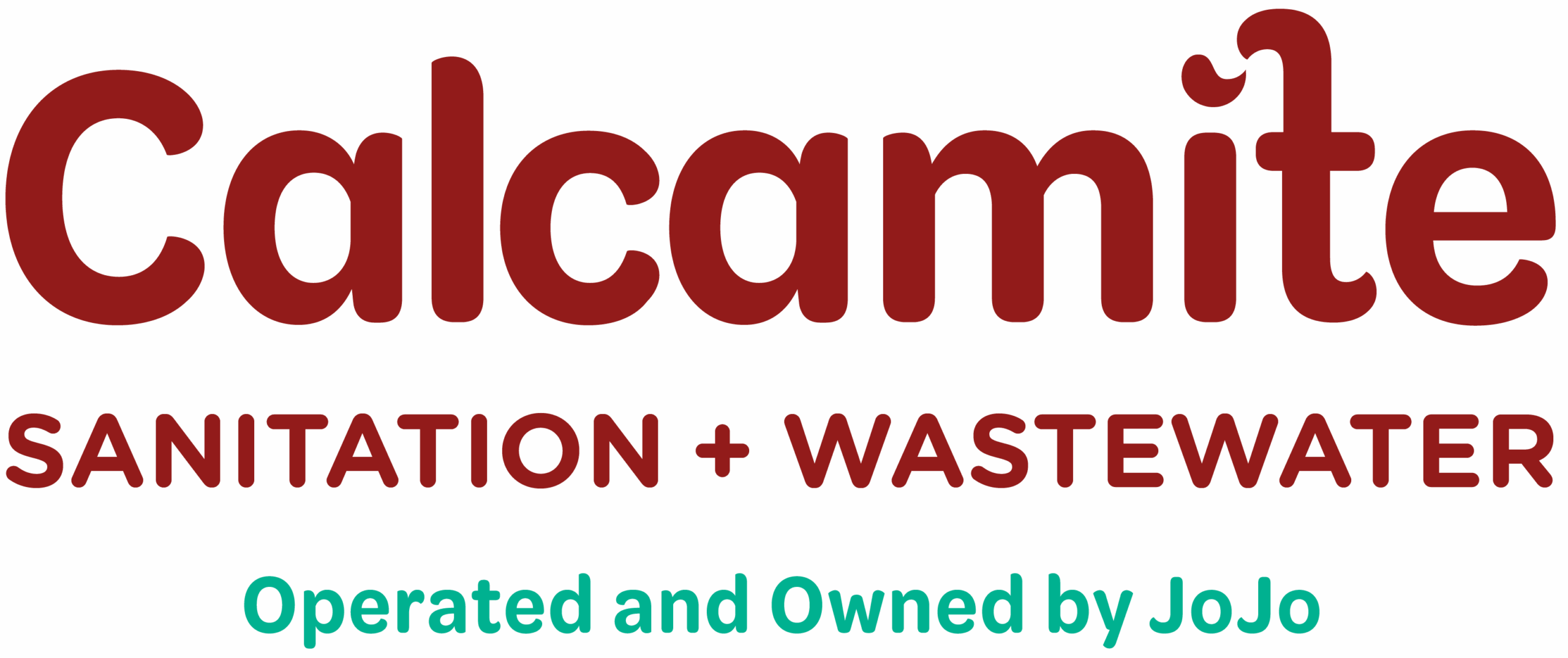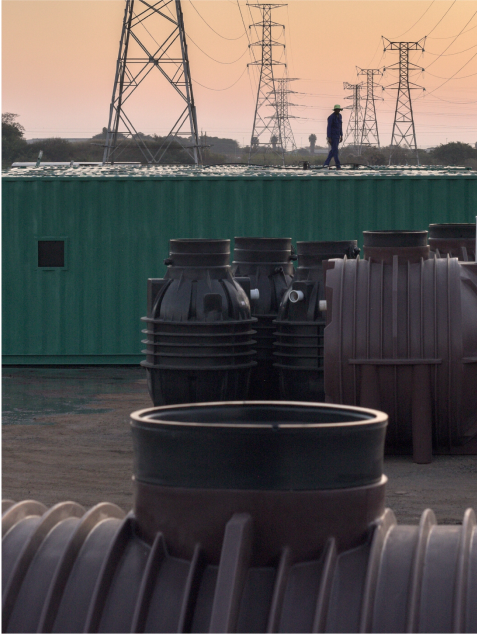As a leader in on-site sanitation and wastewater management solutions in South Africa since 1967, we know that the importance of effective integrated wastewater management can hardly be overstated. It’s crucial for safeguarding public health, protecting the environment, and ensuring the sustainable use of water resources.
Calcamite therefore works hard to advance water security and help safeguard our communities and our vulnerable environment by providing effective solutions to protect this precious, scarce, and life-giving resource.
What is meant by wastewater management?
Wastewater management refers to the collection, treatment, disposal, and reuse of wastewater to minimise its impact on the environment and human health. We employ a series of processes and techniques to remove pollutants, contaminants, and pathogens from wastewater, making it safe to be discharged into the environment or reused for various purposes.
Our wastewater management systems aim to protect water resources and prevent water pollution. We promote sustainable use of water by ensuring that wastewater is properly treated and managed throughout its lifecycle.
By implementing proper wastewater treatment processes and systems, we therefore mitigate the harmful effects of wastewater and maximise its potential benefits. In this comprehensive overview of wastewater management, we’ll explore the various treatment systems, discuss the terminology associated with wastewater, and highlight the environmental and economic benefits of efficient wastewater management.
The Importance of Effective Wastewater Management
Wastewater poses significant risks to human health and the environment if not managed properly. Improper disposal of wastewater can lead to the pollution of water bodies, the contamination of groundwater, and the spread of waterborne diseases. Furthermore, the ever-increasing demand for water resources in South Africa poses great challenges to the country to conserve water and minimise waste.
Calcamite’s integrated wastewater treatment management strategies can effectively meet these challenges and result in a range of benefits. Our comprehensive holistic approach ensures that wastewater is managed in a way that minimises its impact on the environment and maximises its potential benefits.
Wastewater Terminology
Before we delve deeper into the topic of wastewater management, here’s some useful terminology to be aware of:
- Wastewater is a broad term that encompasses all used water from domestic, commercial, and industrial activities. It includes water from sinks, showers, toilets, washing machines, and other sources. This wastewater can contain a range of contaminants, including organic matter, chemicals, pathogens, and suspended solids.
- Greywater refers to the relatively clean wastewater generated from sources such as showers, bathtubs, bathroom sinks, and laundry washing. It doesn’t include wastewater from toilets or kitchen sinks, which contain higher levels of contaminants. Greywater can be treated and reused for non-potable purposes, such as irrigation or toilet flushing, which contributes to water conservation efforts. (Potable water is water that is considered safe for drinking, cooking and personal bathing.)
- Blackwater, on the other hand, is wastewater that originates from toilets and contains human waste and harmful pathogens. Due to its higher level of contamination, blackwater requires more extensive treatment processes to ensure safe disposal or reuse.
- Effluent is generally the term used for the wastewater exiting from a system or a process. This could include the sewage exiting a home, or the processed waste exiting a septic tank.
Understanding the distinctions between wastewater, greywater, and blackwater is essential for implementing the right treatment systems and determining the most suitable methods for managing each type of wastewater correctly. Next, we’ll explore the different types of wastewater storage and treatment systems we use in our wastewater management.
Types of Wastewater Storage and Treatment Systems
The types of wastewater storage and treatment systems employed will depend on the type of wastewater that is being treated.
Greywater Tanks
Our greywater tanks are storage systems specifically designed to collect and store greywater generated from sources such as baths, showers, hand basins and washing machines. These tanks are typically installed on-site and provide a way of storing greywater before it undergoes treatment or reuse. Greywater can be treated through various processes like filtration, disinfection, and/or the addition of chemicals to remove impurities and contaminants before it’s suitable for landscape irrigation or toilet flushing. Greywater tanks play a crucial role in the targeted treatment of greywater and maximising its reuse potential.
Septic Tanks
Our septic tanks are commonly used in areas where centralised sewage systems aren’t available, ground conditions are favourable for the discharge of effluent and it is not near a water course or borehole. They’re underground structures that receive and treat wastewater from residential or commercial buildings. Septic tanks work through a process of natural biological decomposition and separation.
Wastewater flows into the tank, where solids settle to the bottom as sludge, and oils and lighter particles float to the top as scum. The clarified liquid, known as effluent, then exits the tank and enters the drainfield for further treatment and dispersal into the soil. We advise that septic tanks require regular maintenance and periodic pumping-out. This removes accumulated solids, ensures proper functionality, and prevents system failure.
Conservancy Tanks
Our conservancy tanks, also known as holding tanks, are storage systems that retain and contain wastewater without any biological treatment. They’re primarily used in temporary or remote locations where access to sewage infrastructure is limited. Conservancy tanks are designed to collect both blackwater and greywater and store it until it can be properly transported and treated at a designated water treatment facility. These tanks provide a convenient temporary solution for wastewater storage, allowing for controlled disposal or transportation of the wastewater to treatment plants.
Wastewater Treatment Plants
Our wastewater treatment plants (WWTPs) are designed to receive, treat, and safely discharge wastewater from residential, commercial, and industrial sources. They are quick to be installed, are easy to operate and can be sited above or below ground.
Our WWTPs use a combination of physical, chemical, and biological processes to remove impurities and contaminants. These processes include preliminary screening of the wastewater, sedimentation, biological treatment and disinfection. The treated wastewater is then safe to be discharged into water bodies or utilized for non-potable irrigation or industrial purposes.
Our wastewater storage and treatment system all serve specific purposes and are tailored to meet different needs. Selecting the right system for your specific needs will depend on several factors. These include the type and volume of wastewater generated, your location, any existing infrastructure, your desired outcome, and the regulatory requirements that pertain in your area. We’ll also consider your available resources, the groundwater table, and the soil conditions on site.
Find out more about our comprehensive wastewater solutions here.
Environmental and Economic Benefits of Efficient Wastewater Management
Effective wastewater management benefits include the following:
Water Conservation and Reuse
Efficient wastewater management plays a crucial role in water conservation by promoting the reuse of treated wastewater. Treated wastewater can be utilised for various non-potable purposes, such as landscape irrigation, industrial processes, and toilet flushing. By reducing the demand for freshwater, wastewater reuse helps conserve valuable water resources. This is particularly significant in water-scarce regions like South Africa.
Nutrient Recovery
Wastewater is a source of valuable nutrients. It often contains potassium, nitrogen and phosphorus, which are all essential for plant growth and agriculture. Through our advanced treatment processes, these nutrients can be recovered from wastewater and utilised as fertilizers in agricultural practices. This reduces the need for synthetic fertilizers, and minimises the risk of nutrient pollution in water bodies, avoiding eutrophication and harm to aquatic ecosystems. So our efficient wastewater management systems contribute to sustainable agriculture and nutrient cycling.
Reduction in Pollution and Contamination
Efficient wastewater management significantly reduces pollution and contamination of water bodies and the environment. By treating wastewater before its release, contaminants such as pathogens, organic matter, and chemical pollutants are removed or significantly reduced This minimises the risk of waterborne diseases and lessens the negative impact on aquatic ecosystems.
Proper treatment ensures that discharged wastewater meets regulatory standards which protect the quality of the receiving water bodies and preserve biodiversity. Our wastewater management solutions also prevent the contamination of groundwater sources, which are vital for safe drinking water supplies.
Cost Savings and Economic Opportunities
Calcamite’s wastewater management solutions can also save you money and create economic opportunities. By reusing treated wastewater for non-potable purposes, water-intensive industries can reduce their freshwater consumption and operational costs. Additionally, nutrient recovery from wastewater provides an alternative and cost-effective source of fertilizers for agriculture, reducing dependency on expensive synthetic fertilizers.
The implementation and operation of our innovative wastewater treatment facilities create employment opportunities in areas such as engineering, construction, and maintenance, contributing to local economies. This also presents opportunities for the growth of the wastewater management industry. In this way, our sustainable wastewater practices contribute to the responsible use of water resources, protect ecosystems, and foster economic growth.
In Conclusion
Wastewater management plays a critical role in protecting public health, preserving the environment, and contributing to the sustainable use of water resources. Our on-site treatment solutions are vital components of effective wastewater management.
- Our greywater solutions offer opportunities for water conservation and reuse in non-potable applications.
- Our septic tanks and conservancy tanks provide efficient storage solutions for on-site wastewater management, especially in areas without centralised sewage systems, where ground conditions are favorable and discharge it is not near a watercourse or borehole.
- Our wastewater treatment plants are ensures water can be safely used for irrigation and discharged into the environment.
As an industry leader in South Africa with decades of experience, Calcamite offers you a range of advanced on-site wastewater treatment options, including full turnkey solutions. Our treatment systems minimise pollution and contamination, conserve water resources, and protect public health. Our cutting-edge wastewater management processes deliver environmental and economic benefits such as water conservation and reuse, nutrient recovery, energy production, and reduction in pollution.
In partnership with Calcamite, you can also work towards a comprehensive approach to wastewater management, safeguarding the well-being of individuals, communities, and the environment for generations to come.



